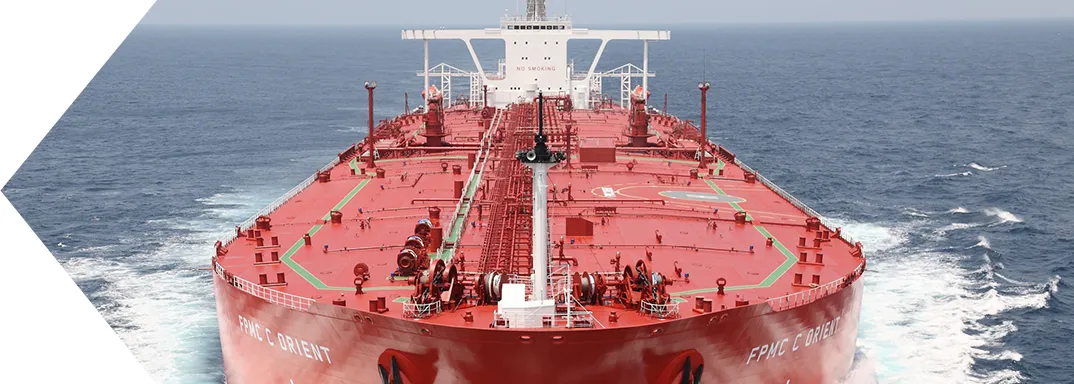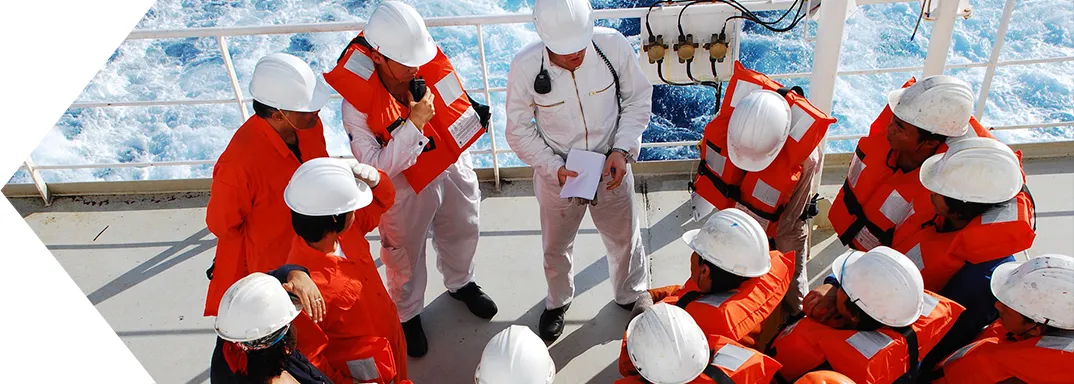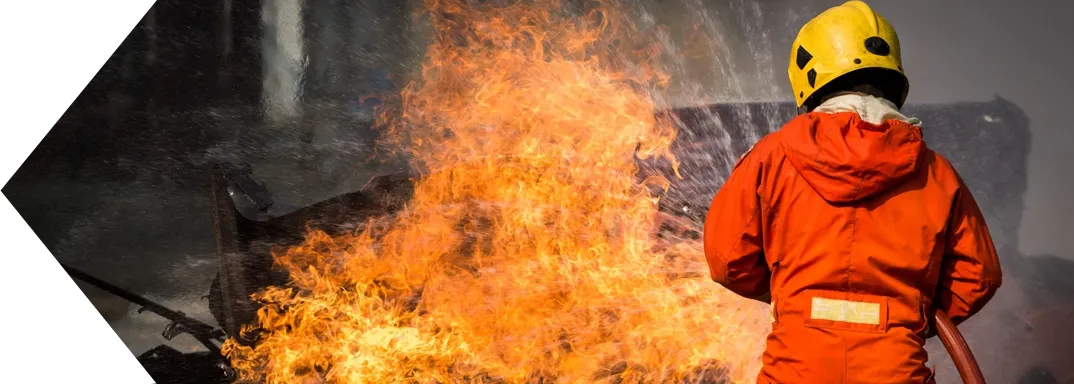

Basic Safety Training
Basic Safety Training
The International Convention on Standards of Training, Certification and Watchkeeping for Seafarers (STCW), requires that seafarers be provided with "familiarization training" and "basic safety training" which includes basic fire fighting, elementary first aid, personal survival techniques, and personal safety and social responsibility. This training is intended to ensure that seafarers are aware of the hazards of working on a vessel and can respond appropriately in an emergency.
According to STCW, The STCW 95 Code requires that you take this 12-day course of instruction. This course has to be renewed every 5 years, The components generally includes:
- Fire Prevention and Fire Fighting (Basic Fire fighting) course of 3 days
- Personal Survival Techniques (PST) course of 2.5 days
- Personal Safety and Social Responsibility (PSSR) course of 4 days
- Elementary First Aid course of 2.5 days
Basic Safety Training or BST is the starting point for persons seeking employment in the maritime industry.
Personal Safety and Social Responsibilities Course (PSSR)
The Personal Safety and Social Responsibilities course forms part of the mandatory basic safety training for all seafarers. The theory based PSSR course provides basic induction training in safety procedures and accident prevention, familiarising seafarers with employment and working conditions aboard.
The knowledge of and compliance with safe working practices at a basic level.
- Human relationships on-board ship.
- Understanding orders and to be understood in relation to shipboard duties.
- Compliance with emergency procedures.
- Precautions to prevent pollution of the marine environment.
The course is classroom based and covers these main areas:
- Comply with emergency procedures.
- Take precautions to prevent pollution of the marine environment.
- Observe safe working practices.
- Contribute to effective communications on board ship.
- Contribute to effective human relationships on board ship.
- Understand and take necessary actions to control fatigue.
- Duration 3 days.
Elementary First Aid (EFA)
Elementary First Aid (EFA) course is one of the four basic familiarization courses ,which a prospective seafarer must do before proceeding to the sea. These courses under the STCW Convention (Standards of Training Certification and Watch keeping) are IMO (International Maritime Organization) requirements and cover the basic knowledge about the Safety & Survival at sea. The present course fully covers the syllabus as prescribed in IMO model course on Elementary First Aid and meets the IMO STCW2010.
All those prospective seafarers and those already seafaring whose business takes them across the seas should possess knowledge of the means available to them to save themselves and assist in saving lives in an emergency. This handbook in addition to providing a reading material for Elementary First Aid course is also recommended for use on board. It is hoped that knowledge and experience gained on completion of the course will enable a prospective seafarer to respond in an efficient manner to emergency situations and which will contribute towards enhancement of safety of life at sea. The course will cover the regulation VIII read along' Section A- VI/l-3 of Code A of STCW convention 1978 as amended in 2010.

Security Training for Seafarers with Designated Security Duties
Security Training for Seafarers with Designated Security Duties
It is a must for each and every seafarer to have the complete knowledge of the security related things required in the career and for that Security Awareness Training for Seafarers with Designated Security Duties is a must before you will be assigned your duties. There are certain designations in which the ISPS Code is applied and the familiarization training is given by the Ship Security Officer or another officer who is equally qualified in the field. They will offer the required guidance and train them to perform the following duties:
- Report the incidents related to security
- Knowing the precise process to follow in case of emergency and threat
- Taking part in the security-related crisis and emergency measures
The above mentioned procedures are included in our Security Awareness Training for Seafarers with Designated Security Duties and must also be included as the key parts of the shipboard adaptation.
Objectives:
The objectives of the Security Awareness Training for Seafarers with Designated Security Duties includes renowned training with the inclusive knowledge that is mandatory in order to build a career in maritime. The course offered by us makes the aspirants perform their duty with responsibility and effectiveness.
The main focus of our Security Awareness Training for Seafarers with Designated Security Duties course is on:
- Upholding the situations set out in the field of the security plan of the ship
- Classifying the risks and threats associated with the ship
- Undertaking the regular security related inspections of the ship
- Using and handling the security systems and equipment
Who should attend the course?
If you are an aspiring seafarers or other looking for making a career in shipboard like armed guards, or you are expected to join the nominated security services in relationship with the Security Awareness Training for Seafarers with Designated Security Duties, shore-based professionals concerned in ship security.
Course Duration: 2 Days
Course Content:
- Ship Security Roles and Responsibilities
- Security Levels
- Emergency Procedure and Contingency Plans
- Threat Recognition and Response
Learning Outcomes:
On successful completion of the Security Awareness Training for Seafarers with Designated Security Duties course our students will be able to reveal complete knowledge and understanding of the following:
- Interpretation of the meanings and the significant supplies of various maritime security levels
- Express awareness and knowledge of maritime security emergency procedures and contingency plans
- Express knowledge of prospective maritime security threats, like weapons, dangerous substances and devices
- Identifying non-discriminatory basis, distinctiveness and behavioral outline of people who can be a threat to the security system
- Demonstrate alertness and understanding of the various techniques involved in avoiding security measures

Basic Training for Oil and Chemical Tanker Cargo Operations
Basic Training for Oil and Chemical Tanker Cargo Operations
Scope:
STCW course provides training for officers and ratings. It comprises a basic training program appropriate to their duties, including oil and chemical tanker safety, fire safety measures and systems, pollution prevention, operational practice and obligations under applicable laws and regulations. The course takes full account of section A-V/1-1 of the STCW Code adopted by the International Convention on Standards of Training, Certification and Watch keeping for Seafarers 1978, as amended, including the Manila amendments 2010.
Course is based on the guidelines of IMO Model Course 1.01.
Objective:
Provided they hold an appropriate certificate and are otherwise qualified in accordance with regulation section A-VI/1 of the International Convention on Standards of Training, Certification and Watch keeping for Seafarers 1978, as amended, those successfully completing the course may be eligible to serve on board Oil and Chemical tankers.
Course content:
- Basic knowledge of tankers
- Physical and chemical properties of oil and chemicals
- Knowledge and understanding of tanker safety culture and safety management
- Hazards
- Safety
- Fire Safety and Firefighting operations
- Cargo operations
- Emergencies For Oil and Chemical Tankers
- Pollution Prevention for Oil and Chemical Tankers
- Case Studies on oil and NLS ship Emergencies
Course Duration: 6 Days

Refresher Training For Proficiency In PST [RPST]
Refresher Training For Proficiency In PST [RPST]
Seafarers who hold an existing personal survival techniques (PST) certificate are required to complete this updating training course to maintain expertise under the STCW 2010 Manila Amendments (STCW Section A-VI/1 & table A-VI/1-1).
The course is an organized combination of theory and practical application.
This course forms part of the compulsory basic safety training for staff. It deals with the activities to be taken by individuals to shield themselves in emergency situations and includes hands-on training in the use of life jackets and inflatable life rafts
The course is classroom based and covers these main areas:
- Safety and Survival.
- Emergency Situations
- Survival Crafts and Rescue Boats
- Personal Life Saving Appliances
- Survival at Sea
- Emergency Radio Equipment
- Helicopter Operations
- Apply first aid to survivors
- Duration 0.5 days
- Reference STCW 2010 Training Circular No.6 of 2011 dated on 27.12.2011

Refresher Course in Fire Prevention and Fire Fighting (RFPFF)
Refresher Course in Fire Prevention and Fire Fighting (RFPFF)
Seafarers who hold an existing Fire Prevention and Fire Fighting (FPFF) certificate are required to complete this updating training course to maintain expertise under the STCW 2010 Manila Amendments (STCW Section A-VI/1 & table A-VI/1-1).
As of 1st January 2017, it will be mandatory for all persons working on ship, to provide documentary evidence of having undertaken or updated certain STCW courses within the previous five years, including Fire Prevention & Fire Fighting (FPFF) training.
For those persons who have already completed the full STCW FPFF previously, the Updating Training course may be used to fulfil the above requirements in lieu of repeating the full course again, subject to the entry pre-requisites below.
This package follows DGS approved programmes of study, designed to refresh your familiarity of sea survival techniques and fire prevention and firefighting techniques that can be applied to minimise risks whilst at sea.
The course is an organized combination of theory and practical application.
FPFF Module:
- Minimise the risk of fire on board
- Refresh skills in the procedure, personal safety requirements and re-familiarise in shipboard equipment
- Refresh skills to fight and extinguish fires
- Duration 0.5 days